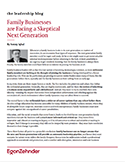Family Businesses are Facing a Skeptical Next Generation
Whenever a family business looks to its next generation on matters of succession, it can encounter four types of responses. The next generation family member could be eager and ready. Or he or she might want to get some valuable external work experience before returning to the fold. A third possibility is no urgency to get involved, knowing that the family business is always there. Finally, the family member could have little or no interest in joining the business at all.
Family business leaders tell us that this last option is becoming increasingly common, as more millennial family members are balking at the thought of joining the business or being developed for a future leadership role. This can be particularly perplexing to current senior leaders since many of them, like the generations before them, typically saw the family business as their calling from an early age.
In my view, there are three major factors at work. The first includes the priorities and values that underline the millennial generation. Generally, they are highly meritocratic, and for them the notion of inheriting a business seems unjustifiable and old-fashioned. Instead, they want to try to establish their own identity—winning the respect that comes from independent achievement and rebelling against the constraints of a work environment where family dynamics may not allow them to succeed.
The second factor is that millennials have a wider set of career options than any cohort before them. An elite college education has become accessible for many children of family business owners, where they sit alongside future surgeons, museum curators and tech entrepreneurs. Family businesses must now compete against this smorgasbord of career possibilities.
Education, and the social networks that come from it, leads to the third factor: next generation family members evaluate the business with a much more informed and critical eye. They know if it is innovative and vibrant or coasting on legacy, or if its infrastructure is robust and scalable or waiting to collapse. And if change is necessary, they will not be swayed by mere promises—they must have conviction themselves that change is possible.
These three factors all point to a powerful conclusion: Family businesses can no longer assume that the next and future generations will provide an automatic leadership pipeline, and hence they must compete for talent—even within the family. Frequent litmus tests for millennials include a professional approach to assessment and promotion, and a comfort with disruption, innovation and new business models. And rather than be seen as an inherited privilege, a family business can be positioned as a responsibility that preserves an institution that is unique and important in the eyes of customers, vendors, employees and the community.
Millennials, with their independent thinking and principled worldview, can be tremendous assets for a family business looking to adapt to a highly complex and volatile world. Recruiting and retaining them can undoubtedly take effort, but family businesses that make that effort will be in a strong position to continue and build on their legacy.






